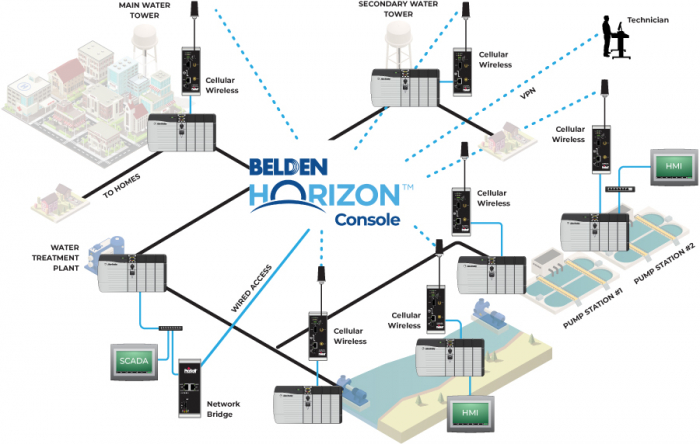Water and wastewater utility switches to cellular and always-on network for new sites

Water and wastewater utility switches to cellular and always-on network for new sites
A New England municipal utility had a range of water and wastewater equipment to monitor, with major consequences if their oversight fell short.
Remote wastewater pumping stations needed to be monitored to ensure they were operating correctly and had no overflow – the latter would negatively impact both local residents and the environment. Meanwhile, water storage tanks’ levels were monitored to guarantee a steady supply of fresh water for the utility’s coverage area.
And this monitoring needed to be low-cost, yet reliable and effective.
For a while, the municipality has used data radios at sites, and that solution works well for them. However, as the coverage area expanded, the utility was faced with adding more sites – and had to consider future expansion when selecting a solution for the new locations. Continuing with the data radios – especially when they didn’t know how many future sites there would be – was an expensive option, and a major capital expenditure. They sought a solution that could work alongside the existing data radios, while enabling the monitoring and control of the remote assets cost-effectively.
Cellular was near the top of their list due to its lower cost and high reliability. Cellular’s ubiquitous coverage also meant they would not need their own infrastructure in place, and ensured a lower overall total cost of operation.
At first, they used modems from one manufacturer. The modems worked, but their setup and maintenance was complex. In addition, the cost of the total solution increased when they figured in the additional hardware they would need at the master end of the modems’ connection.
The utility ended up opting for industrial cellular gateways and the cloud-native program Belden Horizon™. These solutions provided a streamlined way to remotely connect to and monitor each site, and were easily scalable.
They were able to connect the cellular gateways back to their master site, where they installed a wired remote access gateway from ProSoft. Together, these distributed sites and the master site make up the Persistent Data Network (PDN), an always-on remote infrastructure communications network.
“Part of the appeal for this utility is the managed nature of PDN,” explained ProSoft Strategic Product Manager Vishal Prakash, who helped the utility get their new network in place. “For this community and other similar municipalities, network maintenance can be a strain on resources. Now they’re able to monitor their distributed sites from one location – PDN is accessed via Belden Horizon, which they’re able to access from anywhere they have an Internet connection. The system also uses Layer 2 networking and two-factor authentication, so they’re reassured by its security measures.”
Now, the gateways and the previous sites’ data radios all report back to the municipality. The cellular gateways connect to the wired remote access module at the master location, while the data radios communicate to a master that connects to a SCADA system.
Benefits for the utility include:
- Modern technology that’s less issue-prone
- Completely managed solution – ProSoft handles all updates for the utility
- Streamlined setup meant installation took a few minutes
- The ProSoft solutions were immediately compatible with their existing infrastructure, which includes Rockwell Automation® controllers
- Technical support from ProSoft for the gateways and the support provided within Belden Horizon is consistently available
The two most important benefits, of course, are to the municipality’s residents and the surrounding area: With reliable monitoring of the distributed equipment, they’re assured of the reliability of storage tanks and pumping stations. With PDN, the utility’s able to put more focus on keeping its operation running smoothly – and spend less time manually maintaining their communications network.

